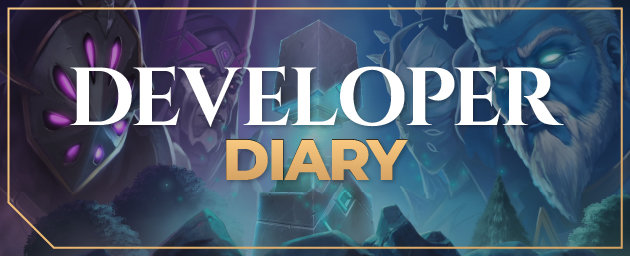Death is changing in RuneScape. 2022 was focused on reflection and research, and now we're ready to bring the transformations in 2023! Read on for all the latest on the project.
Death is a part of Rune-life, and we’ve been discussing death costs in RuneScape for a while. If you’ve ever taken part in Frank’s Free Deaths, our no-cost death event, you’ve been a valuable part of that conversation! Last July we shared some very interesting stats that came out of that event, and announced that we’d be making changes to the death system as a result.
These were our aims for the project:
- Identify potential confusion and pain points in how the death system works.
- Encourage those who are afraid of dying to try PvM.
- Make top-ranking and PvM players feel less punished by deaths.
- Ensure that players understand how much they will pay for dying, so they can make informed decisions about combat encounters.
- Analyse the state of the RuneScape economy, and offset any reduction of GP leaving the game that results from reducing death costs.
- Foster open and honest communication with the community around the subject of death costs.
We also said we'll go into more depth in the future... well, the future is now! Today we will be talking about:
- Death cost changes.
- Economy changes.
- Other system improvements.
- A teaser for the future!
Swap your scythes for a pen and paper today folks – there's a lot to cover and you may want to take notes! We’ve even thrown in a couple of quiz questions to clear your post-Christmas brain fog. Let’s dive in.
1. Why Death Costs Changes?
You don't need to make any clever tools with the Invention skill to analyse the problem here. Death is simply too expensive in RuneScape! But how did it get to be this way?
First, we need to look back to 2014 and 2015 when the system was designed and released. We had two key factors influencing cost design:
Gravestones
Gravestones were the main death mechanism - failing to reach your gravestone meant all dropped items were lost. This was problematic for a number of reasons:
- If a bug put a gravestone in an inaccessible location, items couldn’t be retrieved.
- Many locations needed an adjacent ‘graveyard’ area so graves weren't placed in boss areas - and even then, it could be really difficult to find your own gravestone on new content launches.
- If you lost internet connection, or died just before a game update, there was no way to get your items back.
- If you died a second time, your first grave would collapse.
- Many items were always lost on death, and you had to return to an NPC to reclaim them.
The item loss was good for the game in some ways, as it kept prices more stable, particularly on equipment and consumables which were often unclaimed. But it could also be very, very bad – losing the majority of your wealth because your internet dropped out can be enough to make some people stop playing altogether!
We wanted to reach a middle ground, where items are still removed from the game due to the user’s choice. This led to the sacrificing system and weighting the reclaim costs so that cheaper items had higher reclaim and sacrifice values.
Balancing
With our original balancing, we aimed to do too much for the economy at the time, and not enough for the economy of the future. This peaked in 2011 with the Divine Spirit shield reaching nearly a billion coins, but by 2015 very few items (discontinued items aside) were worth over 300 million. Those that were tended to be weapons, and therefore items which would be protected on death.
Fast forward to 2022, and individual armour pieces are more valuable than the most expensive items of 2015. Players who utilise switches carry even more valuable items too. If you die and lose a Party Hat, 10 million is a pretty small price to pay to get it back, but that's rather on the steep side for regular items.
If we’d had further price thresholds we might not even be discussing this problem now! Hindsight, eh.
Currently, less than 5% of items in death are sacrificed, and the Invention skill now allows for the removal items from the economy on a much larger scale. This means we actually don't need the sacrificing system anymore, and removing it would allow us to simplify the death costs into a flat reclaim cost. Let’s see how that looks in comparison:
| Current Death Costs | ||
|---|---|---|
| Item Value Range | Percentage Cost | Maximum Reclaim Value |
| 0 to 10,000 | 15% | 1,500 |
| 10,001 to 50,000 | 10% | 4,000 |
| 50.001 to 250,000 | 5% | 10,000 |
| 251,000 to 1,000,000 | 2% | 15,000 |
| 1,000,001 to 10,000,000 | 1% | 90,000 |
| 10,000,001+ | 0.5% | 10,687,418 |
| Highest possible reclaim value | 10,807,918 | |
| New Death Costs | ||
|---|---|---|
| Item Value Range | Percentage Cost | Maximum Reclaim Cost |
| 1+ | 0.1% | 2,147,483,647 |
| Minimum reclaim cost of 100 coins per stack of items. | ||
This will be a massive reduction in death cost, with every item having its reclaim cut by at least 80%!
| Item Value | Live Reclaim | 0.1% Reclaim | Decrease |
|---|---|---|---|
| 1M | 30,500 | 1,000 | 96.72% |
| 5M | 70,500 | 5,000 | 92.90% |
| 1B | 5,070,500 | 1,000,000 | 80.27% |
| 2B | 10,070,500 | 2,000,000 | 80.14% |
| 50M | 320,500 | 50,000 | 84.39% |
| 500M | 2,570,500 | 500,000 | 80.54% |
| Max (2,147,483,647) | 10,807,918 | 2,147,483 | 80.13% |
| 10M | 120,500 | 10,000 | 91.70% |
Removing the ‘fixed reclaim’ from the system will also make further reductions. When gravestones were the main death mechanic, items such as Enhanced Excalibur and the Asylum Surgeon's Ring were destroyed when you died. This acted as a gold sink, since you had to travel to the NPC who gave you item and buy it back.
The current death system maintained these item-specific gold sinks, but added Quality of Life improvements where you could simply pay that fee on death instead of having to travel to each NPC to reclaim manually.
It's jarring that these fees can be higher than the reclaim costs for many items, and the link to the direct reclaim costs isn't clear. To simplify the system, fees will be changed to the base reclaim cost for that item. If you destroy the item, you will still have to pay the full price to get it back.
Simply changing the price would just be a quick Ninja fix, but nothing’s that simple, is it? We also need to look at the wider game economy to understand what impact changing these values will have.
2. Economy Changes
To truly understand death costs and their impact, we need to look at the amount of gold in the game. The most important information point here is the daily gold delta – that’s how much gold is generated minus the amount of gold spent and removed from the game. In a game economy it's OK to have a positive delta (more gold added than removed), but it's not so good if the gap gets too big.
Here are a few example scenarios:
| Situation | Gold delta | Explanation |
|---|---|---|
| You kill a creature and it drops 3 coins. | +3 | 3 coins were added to the game. |
| You kill a creature, it drops Hazelmere's Signet Ring, and you sell it on GE for max cash. | 0 | You personally received max cash, but this gold moved from another player. |
| You kill a creature, it drops Hazelmere's Signet Ring, and you alch it. | +300,000 | You personally could have received much more by selling it, but alchemy converted it into coins. |
The amount of gold in game will drastically differ from day to day, such as on a weekend when ‘Scapers generally have more playtime. The data presented here is averaged over a longer term to flatten out the daily spikes.
With this in mind, it’s time for a quiz! Jot down what how much gold you think is added to the game and spent on a daily basis…
Spoiler
| Added | 201,013,251,256 |
|---|---|
| Spent | 112,888,477,879 |
| Delta | 88,124,773,377 |
Let us know how close you were on Twitter with the hashtag #rsdevblog!
Now open your notebook again, because this time the spoiler reveals the top 10 gold sources and top 10 gold sinks, the amount of gold each added, and the percentage of total. Can you guess them all? Sources can appear multiple times - alchemy appears for both invention machines and High Alchemy, General Stores appear in both lists. What do you think the percentages will look like? Eyes down…
Spoiler
| Rank | Gold Source | Average Daily Added | % |
|---|---|---|---|
| 1 | Alchemy: Invention machines | 92,237,061,446 | 45.88% |
| 2 | General Stores | 43,287,613,975 | 21.53% |
| 3 | Alchemy: High Alchemy | 24,735,268,309 | 12.30% |
| 4 | Monster Drops: dropped to floor | 14,557,269,208 | 7.24% |
| 5 | Monster Drops: advanced coin magnet | 9,545,511,576 | 4.74% |
| 6 | Treasure Hunter: cash bags | 8,482,852,011 | 4.22% |
| 7 | Money Tree | 2,603,368,991 | 1.29% |
| 8 | Prifddinas pickpocketing | 1,433,368,555 | 0.71% |
| 9 | Treasure Hunter: direct coin prizes | 1,089,816,085 | 0.54% |
| 10 | Crystal chest | 884,965,556 | 0.44% |
| - | Other | 2,156,155,544 | 1.08% |
| Rank | Gold Spend Source | Average Daily Spent | % |
|---|---|---|---|
| 1 | Death | 69,832,758,793 | 61.86% |
| 2 | General stores | 22,430,923,734 | 19.87% |
| 3 | Bond tax | 6,021,212,052 | 5.33% |
| 4 | Degrading item recharging | 3,751,541,446 | 3.32% |
| 5 | Kingdom of Miscellania | 2,598,155,242 | 2.30% |
| 6 | Boss instances | 2,272,841,204 | 2.01% |
| 7 | Prifddinas: max guild portal redirection | 1,102,091,481 | 0.97% |
| 8 | Prifddinas: combination potion unlocks | 791,648,148 | 0.70% |
| 9 | Nex armour recharging (older system) | 775,269,191 | 0.68% |
| 10 | Player Owned Ports Smuggler | 369,518,063 | 0.32% |
| - | Other | 2,942,518,525 | 3.27% |
Note: This data does not include Spirit Shards, Richie pet donations, or a handful of other sources. Since identifying these omissions we have made changes track them properly, but we need long-term data. However, based on separate investigations it's not expected any of them will make a significant impact on gold generated or spent.
This one was much more difficult, so well done if you got even close with any of your guesses!
Let us know how close you were on Twitter with #rsdevblog.
On the ‘gold added’ side, we can see 80% of the top 10 comes through converting items to coins. Which items are being converted to coins most is an important data point when attempting to reduce the gold added in this manner, but that's a topic for another day.
On the ‘gold spent’ side, this is where making changes is a major concern. It's by far the biggest way we remove gold from the game, and any meaningful reduction to a reclaim value players will be happy with will cause a huge shift in the daily delta. This means we need to find a way to make up this deficit in order to adjust death costs.
How much gold do we need to account for here? Due to technical limitations we had to make an estimate based on the potential decreases in death costs and the 70 billion daily gold spent.
| Reduction | New Amount | Gap to Fill |
|---|---|---|
| 90% | 7B | 63B |
| 85% | 10.5B | 59.5B |
| 80% | 14B | 56B |
When you consider General Stores convert around 21 billion more to gold than is spent across both tables, we need a gold sink that is ten times more effect than the second best gold sink.
So, what approaches could we take? Here are some ideas we considered:
| Possible Change | Does this close the gap? | Was this viable? | Core Design Idea | Why does it work or not work? |
|---|---|---|---|---|
| Nerf item to coin conversion | Yes | No | Lower alchemy values for lower gold added | This would require significant reductions to generally reduce item → gold conversion by 50%. It would mean reducing alch values on both monster drops and skilling supplies, massively changing the understanding of the game. |
| Nerf alchemy machines | Partially | No | Lower 'Alchemy: Invention machines' gold generation | Alchemy machines are a convenient way to convert items to coins, but they're not the problem themselves. Even if we made them so expensive they were not worth using the items could still be converted to coins in other ways. |
| New content | No | No | Make something new where people want to spend gold | This would need to be 20x Kingdom of Miscellania, without rewarding alchable items. |
| General stores contents | Partially | No | Add more items to General Stores | This would consider more spending in a location players already spend a lot of money, but we would need to quadruple current spend. |
| GE Tariffs | Yes | Yes | Grand Exchange seller pays a small fee to sell items | Covered below this table. |
We looked at the Grand Exchange trades to predict how much gold a tariff would remove.
| Base Value | Removed Estimate |
|---|---|
| 0.5% | 21.53B |
| 1% | 43.07B |
| 1.5% | 64.60B |
| 2% | 86.14B |
| 3% | 129.20B |
| 4% | 172.27B |
| 5% | 215.34B |
Of course, these values assume all player behaviour will remain the same, but it's impossible to predict how that might change; players may decide to sell more items in player-to-player trades, which will continue to have no tariffs. The 1.5% estimate would theoretically cover the death cost deficit, but we aimed for 2% to have a buffer.
We did consider whether or not we should look to reduce the overall daily delta, but ultimately decided on ensuring the death costs were covered and keeping day-to-day impact to a minimum. We do believe the economy needs further improvements, but we wish to monitor the impact of these changes first.
The release tariff will be 2%, not applying to items traded below 50 coins each.
Here's how this looks in-game:
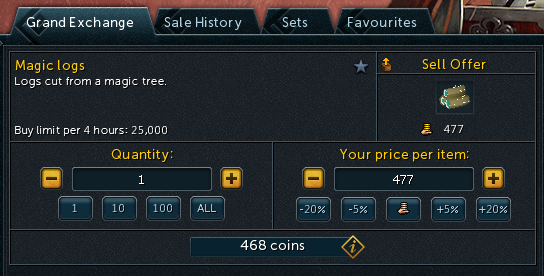
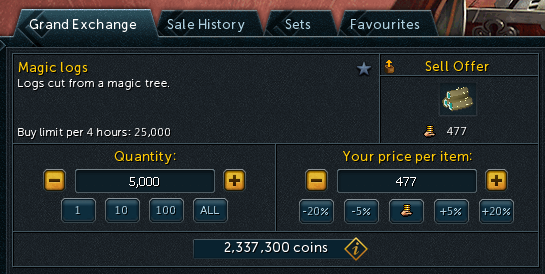
When you open the interface to sell an item, the 'total price' preview box will show the amount of coins you will receive minus the tariff costs. This is automatically applied when the transaction completes, so you don't have to worry about any extra steps when it comes to selling your items. This is applied on a per-item basis, so you can cancel or relist your trade at any time with no additional penalties.
Meanwhile, the info box provides a tooltip detailing how the tariffs work:
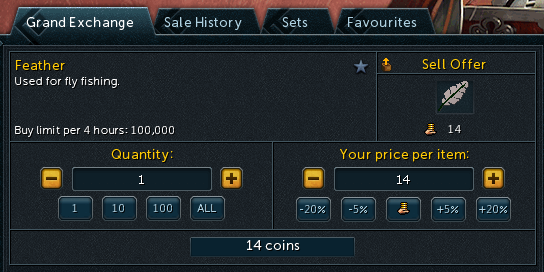
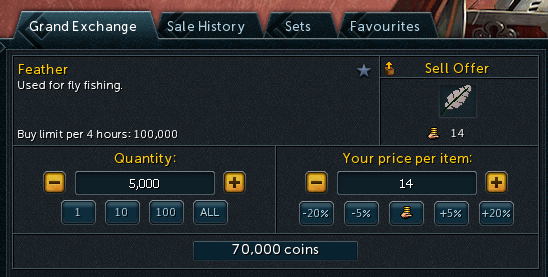
A tariff will not be applied to items worth less than 50 coins, as the singular item tariff would round down to zero.
3. Other Death Changes
In addition to changing reclaim costs, removing sacrifice functionality, and removing fixed death costs, we've looked at making some other system and Quality of Life improvements!
Ring of Death
The current on-death effect is to teleport you away, at a cost of 15% of the Ring’s charges, rather than going to death. This item has largely served as a band-aid to the death costs problem, but we no longer feel it's right to effectively have two competing death costs.
The Ring of Death will no longer teleport you to safety. Instead you get the opportunity to finish your kill(s) and/or escape.
Upon dying you will revive at full health, and you’ll get three minutes of the quick hitting DoT (Damage Over Time) effect. The damage this deals will increase every hit, meaning it increases by 100% of the base hit every minute. After three minutes the damage will stop, and there will be a cooldown of three minutes before it can activate again. The effect and cooldown can also be cleared early by entering a Bank or praying at the altar in War's Retreat.
This will take effect before Signs of Life (and similar effects) kick in – Signs will work while the DoT is dealing damage. Other reviving effects such as the immortality ability will also work in combination.
Overflow Storage
Previously, if Death was holding your items when you died a second time he was forced to discard your previous items. Now he’s had a bit of a new year tidy-up and he's got space for additional overflow storage! This storage space is more expensive and items will cost 1% of their Grand Exchange cost to replace, so it's always best to reclaim your items as soon as you can!
Unlike regular Death reclaim, overflow items can only be reclaimed to your Bank, and each item must be reclaimed individually (in case you lack the funds to reclaim everything).
Destroy-On-Death Items
A common feature on items is to have a 'Destroy' option, rather than 'Drop'. This is useful for unique items, or to give a warning if you can only reclaim it from a specific location. By default this also means the item is lost on death, and sometimes that specific item should be safe for Death to keep a hold of.
We wanted to investigate removing this as a feature, but there are tens of thousands of items, including one-time quest progress items, from older content that poses a big risk to change at scale. So, we scaled back to trying to filter out some items and making changes to them. Some of the items that can now be stored by Death include:
- Archaeology consumables
- Ascension fragments and ammo
- Divination locations
- Divine charges
- 'Eye of the ...' Dungeoneering Reward Rings
- Statue rock replica pieces
- Triskelion parts
- Urns
- Veteran Skillcapes
…and plenty more miscellaneous items too!
Interface Redesign
We have made steps to simplify the death interface, improving navigation and providing clearer information about death mechanics.
Here are some screenshots of the reworked UI:
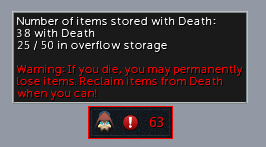
We've also added some extra detail into the ‘Gravestone Timer; and renamed it to ‘Death Status.’ If you have a gravestone this will show you the gravestone timer as it usually does, otherwise it will show the number of items stored with Death - and if you're at risk of losing items it will warn you to reclaim your items. When you have no items with Death there will be nothing to show!
4. The Future
While discussing the wider game economy we really wanted to make this update even more impactful, so we have been investigating ways to increase the max cash limit. We feel this is really important for the long-term ability to trade items as more valuable items are available. Updating all of our game systems - including the Grand Exchange - to support this is a huge undertaking, so we took the difficult decision to split this into two projects.
Death Cost improvements outlined here will be making its way to a graveyard near you in January, while we're aiming to get the max cash increase with you in the first half of 2023.
The current expectation is that the Money Pouch will be able to hold above max cash, and that cash can then be traded both in player-to-player trades and through the Grand Exchange. Most other inventories such as the Backpack or Bank will have the current limitations, but richer players should no longer need to juggle between multiple storage locations and spirit shards, as the Money Pouch will be able to handle gold amounts into the quintillions - that's a lot of zeroes!
The End (For Now)...
Thanks for taking the time to read today's development blog. The changes may take a little getting used to, but we will continually be monitoring their impact on the economy, and of course, we may make further tweaks in future. Whatever happens next, we’ll always be aiming for the best outcome for the game as a whole – and and we'll always keep you informed.
Here's to some spectacular deaths in 2023!

